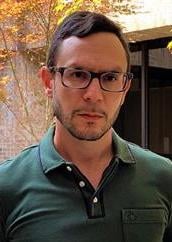TRINITY RIVER AUTHORITY GENERAL COUNSEL SHARES INSIGHTS ON TEXAS WATER LAW
 Howard Slobodin is General Counsel to the Trinity River Authority of Texas and an adjunct professor at Texas A&M University School of Law. During his presentation on November 8, 2021, Slobodin gave students insight into the private and public practice of water and environmental law through his own life experience.
Howard Slobodin is General Counsel to the Trinity River Authority of Texas and an adjunct professor at Texas A&M University School of Law. During his presentation on November 8, 2021, Slobodin gave students insight into the private and public practice of water and environmental law through his own life experience.
Slobodin began his legal career at the Texas Attorney General’s office in Austin. He recalls that one of the cases that stood out the most involved the intersection of hazardous waste and water. The San Angelo Electric Service Company was releasing polychlorinated biphenyls (PCBs) into the soil and groundwater on their property. In order to address the issue, the Texas Commission on Environmental Quality looked at business records in order to get all potentially-responsible parties to pay to clean up the site. The case made an impression on Slobodin because of the extent of strict liability’s reach, noting that the parties obligated to pay went all the way down to the electric companies.
After Slobodin left the Attorney General’s office, he entered private practice for five years. It was there that he was able to participate in a foundational permit takings case: Bragg v. EPA. Slobodin’s clients, Jen and Joelyn Bragg, had two pecan orchards with wells predating the Edwards Aquifer Authority (EAA). When deciding the Bragg’s water permits going forward, the EAA set it at their highest water use between 1972 to 1993. That allocation, however, was sufficient to support the two orchards the Braggs wanted to nurture to maturity, so the Braggs filed constitutional takings and equal protection claims in federal court. Slobodin left before the case received its final decision, but he left private practice feeling as if he completed “about ten years of work in five years.”
Shortly after reentering the public sector as General Counsel to the Trinity River Authority, Slobodin began work on the R.C. Thomas Hydroelectric project. This clean energy initiative was designed to capture potential energy through the water released from Lake Livingston. Slobodin started working on the contract documents for the hydropower project in 2008, walking the tightrope of potential regulatory risk with the project stakeholders. It wasn’t until November 12, 2021, when Slobodin attended the dedication of the plant, that he could finally see the project completed, marking his participation in the project from its infancy to its fruition.
Of all of the jobs he has had during his career, Slobodin says that water sales remain one of the most interesting. Slobodin has completed three major water sales, with some of them lasting for as long as a century. Due to Texas water pricing regulations, water contracts have to be negotiated with an open price term contract. In one sale, Slobodin undertook a major water reuse project with the North Texas Municipal Water District that ended up becoming extensively intertwined with the Clean Water Act (CWA). Not only did the construction require a CWA § 404 permit for dredge and fill, but the federal government also imposed more stringent instream flow requirements on the project than required under Texas law.
Slobodin’s latest focus has been working on water policy and litigation in Texas. He reflected on the importance of having a group of people coming together to give most bills a fighting chance, and how much water law is created in the wake of state crises. Slobodin highlighted his experience with one of the quirkier aspects of Texas water law: local bills. He asserts that local bills are the wild cards of the Texas legislature. These unique pieces of legislation can pass with minimal sponsors and quick turnaround due to their highly localized approach. Local bills can help provide quick wins for localized relief.
Slobodin concluded his presentation with advice for how current students can break into water and environmental law. He urged interested students to consider geographical constraints, and to use their passion for the field to motivate them to move as job opportunities present themselves. He urged students to look into openings at districts, cities, and river authorities.